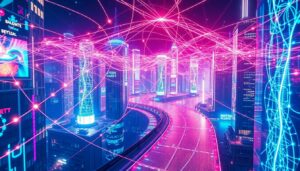Ever wondered how your phone knows it’s you? And those self-driving cars? It’s computer vision! This is the domain where machines are taught to “see” like us. It’s a kind of artificial intelligence, and it’s transforming a number of industries. Such tech enables new opportunities and increases efficiency.

In this guide, we’re going to focus on computer vision for beginners. We discuss the concepts, methodologies, and applications. You’ll learn enough to at least get a grip on this exciting field. To find out how machines are learning to see the world.
What is Computer Vision?
Computer Vision: Computers can see and understand images. It concerns AI, machine learning and image processing.” The main goal? All these are for allowing machines to comprehend visual information. They’ll then be able to make sense of their surroundings.
Computer Vision vs Image Processing
Image processing is not the same as computer vision The task of image processing is to modify and improve images. You can think of filters as you use them on your phone. Computer vision tries to learn what’s in the image. It’s similar to showing a computer how to explain a photo.

The General Algorithm for Computer Vision System
Block Diagram of Computer Vision System It must first use sensors to acquire an image. Next, it cleans up the image. It is called as pre-processing. Then it identifies significant components (features). Last but not least, that image is detected or recognized.
Computer vision — A Core Concept of AI
Fundamental concepts are the foundations upon which computer vision systems are developed. Let’s look at some.
Image Representation
Images are stored as numbers. [7] Each tiny square (pixel) has a color value. RGB (red, green, blue) is applied to color images. Grayscale Images use shades of grey. It is a digital format that allows computers to process images
Feature Extraction
Feature extraction identifies the most salient parts of an image. It will detect lines and shapes (edge detection). Detect corners and corner detectionCorner detection Texture analysis examines patterns. These features allow the computer to know what it is seeing.

Image Classification
Deep Learning is used for Image classification It categorizes images into classes. For example, Support Vector Machines(SVMs), Convolutional Neural Networks ( CNNs ) etc. These models are trained to identify individual objects or places.
Common Computer Vision Methods
Data processed by a computer vision enters from different pathways. Here are some common ones.
Object Detection
The more advanced, object detection finds me, you, a chair, a cat… things in an image. For example, those include finding cars and people in a street scene. And algorithms such as YOLO and SSD are employed. This is essential for self-driving cars — and robots.
Image Segmentation
Image segmentation is the process of partitioning images into segments. This can be helpful for medicine. For example, it assists in interpreting medical images. Segmentation can be of different types like semantic segmentation and instance segmentation.
Facial Recognition
It identifies people’s faces–facial recognition. It’s used for security and by social media. The technology can open your phone or add you to a photo.
For one, imagery is distributed considerably across sectors.
Many of the areas of computer science using machine learning. It is bettering the way we work.
Healthcare
Computer vision examines medical images in healthcare. It aids in locating tumors in X-rays, and is useful during surgery. It can also aid in diagnoses, and enhance patient care.
Manufacturing
Computer vision is used for quality control in manufacturing. It finds defects in products. It’s also used to program robots to automate tasks. This allows manufacturing to be more efficient.
Computer vision is what self-driving cars rely on. The car uses cameras to sense and comprehend the environment. This assists the car in safely navigating roads.
Retail
Computer vision is also being used in retail. It is also being used to improve self-checkout systems, inventory management, and customer behavior analysis. Track stock, improve customer experience.
Kicking Off with Computer Vision
Looking to get started with computer vision? Here’s how.

Automotive
Computer Vision Libraries and Frameworks
OpenCV is a popular library. Common frameworks include TensorFlow and PyTorch. They offer tools for constructing computer vision systems. Check their docs for more details.
Online Courses and Resources
So there are a lot of computer vision online courses. Websites such as Coursera, Udacity, and fast. ai offer these courses. You may also obtain datasets on which to practice.
Conclusion: A Look Ahead at Computer Vision
Computer vision enables machines to observe and interpret images. It involves image representation, feature extraction, and classification. It has various applications spanning domains. Because of the advances in tech, computer vision will change the world in very powerful ways.



